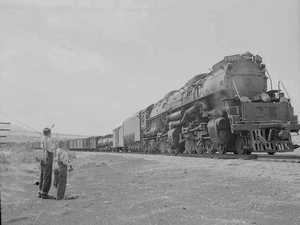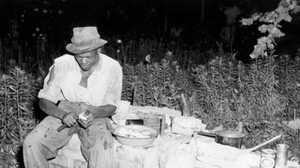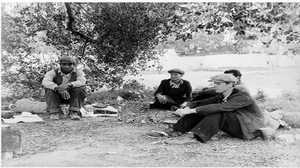Tales From the Rails

A Vagabond's Christmas
Born on a Nebraska farm in 1916, Donald Newhouser rode the rails from 1935 to 1938, following the harvests through the West: the hay fields in Colorado, potato picking in Idaho, apples in Washington, hops in Oregon.
"I was sitting on a railroad track, somewhere in Montana, waiting for a freight train. I was 19 years old. It was getting dark, and as I looked down at a village below, I saw a Christmas tree lit up in a window and children playing around it. Tears ran down my cheeks as I remembered a Christmas Day when I was the age of those children."
Losing a Brother
When Gene Wadsworth caught his first freight at age 17 on a winter's night in 1932, he'd never ridden on a train before. Orphaned at age 11, Gene was living in Burley, Idaho with an uncle who had five children of his own. "Why do you hang around here when you're not wanted?" one of his cousins asked him. That night, Gene stuffed his few belongings into a flour sack and hit the road.
Taking the advice of older vagabonds, Gene headed south to warmer climes and transient camps established by the government, where he could get work at $1 a week, plus food and shelter. Moving between camps in California and Arizona, he made friends with a young man in the same position.
"Jim was also blond, my age and size -- six feet and 165 pounds. Everyone believed we were brothers. We thought a lot alike and hit it off very good. We teamed up and decided to make our fortune together. All went well with us, until one night when Jim and I were riding on the ladders between two boxcars. It was so cold my hands nearly froze. I slipped my arm over a rung of the ladder and put my hand in my jacket pocket. Being back to back, I couldn't see Jim. All of a sudden the train gave a jerk, as it took up slack in the draw bars. I heard Jim let out a muffled moan, as he fell. I whirled round and made a grab for him. He had on a knit cap. I got the cap and a handful of blond hair. Jim was gone. Disappeared under the wheels. No way could Jim survive. I got so sick I'd to climb up and lie on the catwalk. From then on, I was a loner. I never teamed up with anyone, but always traveled alone."
Battling the Bulls
Weaver Dial of Seattle, Washington's first ride in 1929 took the 12-year-old over the Cascade Mountains. He left Seattle with his friend, Emmy, at 11 o'clock one night; they reached the Auburn yards at 2am and began the eight-hour haul over the mountains shortly afterwards.
"In San Francisco, we rode the back of a passenger train right into the depot. We'd just stepped off the coal tender when we heard a voice, 'Stop, or I'll shoot!'
Two railroad bulls hauled my partner and I into a sub-station, and went through our wallets. After some lengthy questioning, they fined us $10. We only had three bucks between the two of us. They told us to get the hell out of there!
We thought the San Francisco bulls were shakedown artists, until we hopped a freight out of Cheyenne, Wyoming. As the train began to crawl out of the yards, we took note that 'bos were scrambling off the boxcars. A railroad bull was walking down the top of the boxcars, checking for passengers hiding between the cars. Another bull was on the right side, and one more covering the left. Nobody rode that one out of Cheyenne.
A gloom set over the would-be riders, until some jungle professor got the word out that you could catch the next train nine miles up the road. The grade was steep and the train had to slow down at a bridge. All began the trek up the nine-mile hill. Some had large packs on their backs, with sleeping gear and cooking pots. A farmer let us drink our fill of water at his well, and we made the rendezvous at the bridge.
Several hours went by. I passed the time doing some cartooning in charcoal under the bridge. 'Here she comes!' somebody yelled.
All hands scrambled for a boarding position along the tracks. Uneasiness set in when we spotted the engine had a helper. Two engines! She roared past us in a cloud of dust, and nobody was fool enough to grab for the iron ladders. A fireman waved from the engine cab, and showed us a mouthful of teeth, giving us the old Wyoming horse laugh.
Some of the 'bos threw rocks at the jeering comedian. I saved my energy for the nine-mile walk back downgrade to the Cheyenne railroad yards.
Under cover of darkness, a bunch of determined riders finally got aboard a train. We rode her out for several hours, before we pulled up to a stop in a small town in Nebraska. Once again, the three railroad bulls appeared. One walking down the top, pistol in one hand, a flashlight in the other. Two others covered the right and left of the train.
They rounded us up at gun point and herded us into a small railway station. Once inside, we were lined up and told to take off all our clothes. As one bull stood guard, the other two meticulously went through our pockets, the brims of our caps, even detailing our shoes and fingering our belts. They made the rules: 'You can't ride the Union Pacific without paying. All of you with money will be allowed to keep one half, the rest will go to pay for your fare.'
Four bucks was my entire bankroll. I was given a $2.00 ticket on the first passenger train that stopped. A hard-working bindle stiff, who'd been following the harvest had $80 on him, which he planned on taking home to his family. His boxcar fare was $40, which they sacked. It was a heartless thing to do, with no concern for his labors whatsoever. My feelings for railroad bulls were never lower."
I Was a Burden
Leslie E. Paul's vivid memories of leaving home in the summer of 1933 begin on the back porch of his house in Duluth. He was 18 years old, newly graduated from high school, the son and stepson of railroad men.
"It was the Depression; there was no work. I was a burden to Mother and Gus, my step-father. I took the blanket and hurried home. I said nothing to Mother then, only that I was going down to Scott's to get a flat fifty box of cigarettes. Ordinarily I was reluctant to add to the delinquent account; today I found abundant courage. Besides the tin of cigarettes, I asked for two sacks of Golden Grain. 'Charge it,' I said. Scott looked taken aback but said nothing.
I returned home and told Mother I was leaving. She didn't fight it, but she was sad. Mother owned no suitcase or tote. All she had was a black satin bag, the size of a pillow case. I jammed my new sleeping bag inside it, three or four pairs of socks, shorts, an old sweater, the cigarettes and sacks of Golden Grain. Mother made two sandwiches. She went to her purse and gave me all the money she had: 72 cents.
I gave Mother a big kiss and a long, tight hug. She said nothing, but the tears streamed down her face. I turned and left, the black satin bag over my shoulder. Had I been brave enough, I would've been coward enough to go back.
I stopped at the roundhouse and found Gus working on one of the engines. Gus hadn't really been a father, but I owed him a lot. I had a roof over my head and there was always something to eat. I shook his hand and said good-bye.
The freight yard was a terminal for trains going to Canada. My best bet was to go to Carleton, 19 miles away. The easiest way to get there was to walk.
I crossed the tracks, climbed the fence and started up the hill to the highway. I turned around at the top. The tears came then, and one sob. The second one I swallowed. Every boy becomes a man, some younger, some older. I was eighteen and one week. Was I leaving little for nothing?"
Going to California
Henry Koczur left his East Chicago home in September 1932 at 16, believing that one less mouth to feed would lighten the burden on his family of eight. His father was out of work and sick with stomach ulcers; his mother often had to serve potato soup for breakfast, lunch and supper. Henry headed for California, "a land where I didn't think anyone could starve. Many times when the freight trains stopped at night, we'd light a match just to see what was growing in the fields."
"We caught a Southern Pacific passenger train to Niland, California, riding the blinds with two other hobos. When the train stopped, we all got off. We were caught by a bull, who ordered us to line up next to the train. Had any of us tried to jump back on, I'm sure he would've shot us.
When the train left, the bull asked how much money I had. 'Not a cent,' I said.
One of the men who rode the blinds with us was next to me. The man had $2.00. The bull told him to take it out and hold it in his hand.
The second man had 50 cents. My buddy, Jensen, had 20 cents. The bull collected the money. 'This will pay for your fare,' he said. He put the $2.70 in his pocket and told us to start walking.
I tripped over a railroad tie. The bull thought I was trying to get away. He gave me a kick in the butt that to this day I never forgot. I saw he was going to hit me over the head with a blackjack. I raised my arm, and he struck my fingers, cracking the knuckle of my forefinger. He warned us to hit the highway and never set foot on railroad property again.
We slept the night in the desert. Walking down the road in the morning, we saw a train being made up for Yuma. There must've been 50 hobos waiting there, who'd met the same fate the night before. We all climbed into an empty boxcar and shut the door, not making a sound as we waited for the freight to leave.
All of a sudden, the door slid open. Who is looking at us, but the same bull who kicked and black-jacked me. 'Get the hell out of here,' he shouted.
I was first to jump out and run. We were 100 feet from the train, when one of the bums hollered, 'Hold it, guys! There are 50 of us. He has six bullets in his gun. He knows he can shoot six of us; after that he's a dead man.' We listened to him. When the engineer gave the highball, we ran to the train.
Almost all climbed back into the boxcar for the ride to Yuma. We left the bull standing there, with his legs spread out and his hands crossed over under his arms."







